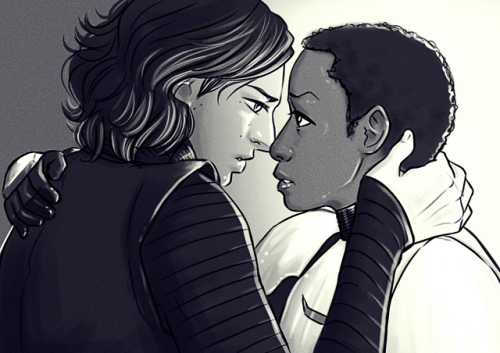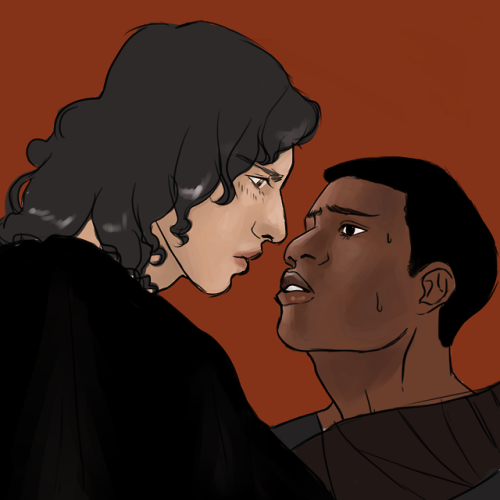We meet on a late July day, in the privately booked upstairs of a lightly boujie restaurant, owned by one of Boyega’s friends, in London’s St John’s Wood just as the city edges towards another post-lockdown heatwave. There is an introductory elbow bump as two alcohol-free Mojitos are ordered (he is a long-term teetotaller; it seemed polite to join him) and time to take in a physical transformation that, in its own way, is as dramatic as the philosophical shift he has clearly undergone in recent years. Mostly gone is the puppyish, kinetic figure that many first met during the extended press jamboree of
The Force Awakens. Though he will occasionally oblige with a pitch-perfect impression (Boris Johnson garbling evasively at a press conference, say), his resting expression is a determined, all-business smoulder; he now possesses stillness and the gym-thickened build of a Depression-era heavyweight; and there is a high decibel, pulpit-ready passion and ferocity to the way his sentences unfurl and crescendo with unblinking eye contact. His hair too – grown out for the past two years and worn today, as it is in his
GQ cover shoot, in tightly plaited, swishing braids – is, it turns out, of almost Samsonian significance to him.
“When black men grow out their hair it’s a very powerful thing,” he says. “Culturally, it stands for something.” In fact, it was what Boyega saw as attempts to control his appearance – allied with the smothering feeling of his packed diary leading into 2017 – that caused him to question his place in the sausage machine of big-ticket moviemaking, that made him wonder if there was actually room for someone who looked like him to exist on his own terms in an industry generally built to white standards and white norms.
In the continued afterglow of that first, franchise-defibrillating
Star Wars film, he continued to notice a stylist he'd hired when he first started doing press “cringing at certain clothes I wanted to go for”, the hairdresser who had no experience of working with hair like his but “still had the guts to pretend”, and he decided that he could no longer grin and bear it like a grateful competition winner. “During the press of [
The Force Awakens] I went along with it,” he notes. “And obviously at the time I was very genuinely happy to be a part of it. But my dad always tells me one thing: ‘Don’t overpay with respect.’ You can pay respect, but sometimes you’ll be overpaying and selling yourself short.”
With the Lucasfilm-branded elephant in the room acknowledged, it is even harder to ignore. This is Boyega’s first substantial interview since finishing the franchise – his first since last year’s
The Rise Of Skywalker tied a highly contentious, hurried ribbon on the 43-year-old space saga. How does he reflect on his involvement and the way the newest trilogy was concluded?
“It’s so difficult to manoeuvre,” he says, exhaling deeply, visibly calibrating the level of professional diplomacy to display. “You get yourself involved in projects and you’re not necessarily going to like everything.
[But] what I would say to Disney is do not bring out a black character, market them to be much more important in the franchise than they are and then have them pushed to the side. It’s not good. I’ll say it straight up.” He is talking about himself here – about the character of Finn, the former Stormtrooper who wielded a lightsaber in the first film before being somewhat nudged to the periphery. But he is also talking about other people of colour in the cast – Naomi Ackie and Kelly Marie Tran and even Oscar Isaac (“a brother from Guatemala”) – who he feels suffered the same treatment; he is acknowledging that some people will say he’s “crazy” or “making it up”, but the reordered character hierarchy of The Last Jedi was particularly hard to take.
“Like, you guys knew what to do with
Daisy Ridley, you knew what to do with
Adam Driver,” he says. “You knew what to do with these other people, but when it came to Kelly Marie Tran, when it came to John Boyega, you know fukk all. So what do you want me to say? What they want you to say is, ‘I enjoyed being a part of it. It was a great experience...’ Nah, nah, nah. I’ll take that deal when it’s a great experience. They gave all the nuance to Adam Driver, all the nuance to Daisy Ridley. Let’s be honest. Daisy knows this. Adam knows this. Everybody knows. I’m not exposing anything.”
He is on a breathless roll now,
breaking his long corporate omerta to touch on the unthinking, systemic mistreatment of black characters in blockbusters (“They’re always scared. They’re always fricking sweating”) and what he sees as the relative salvage job that returnee director JJ Abrams performed on
The Rise Of Skywalker (“Everybody needs to leave my boy alone. He wasn’t even supposed to come back and try to save your shyt”).
Even though he also acknowledges that it was an “amazing opportunity” and a “stepping stone” that has precipitated so much good in his life and career, he is palpably exhilarated to be finally saying all this. But to dismiss these words as merely professional bitterness or paranoia is to miss the point. His primary motivation is to show the frustrations and difficulties of trying to operate within what can feel like a permanently rigged system. He is trying, really, to let you know what it feels like to have a boyhood dream ruptured by the toxic realities of the world.









 every time i see this thread
every time i see this thread






